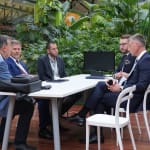
During the Central European Plastics Meeting in Budapest, the "CEE Recycling Round Table" meeting also took place - for plastics recyclers from Central Europe. Leading recyclers from the region have been discussing the future of the industry for many months, discussing the changing business environment, which is particularly influenced by the actions of the European Commission.
The initiators of the recyclers' forum were Laszlo Budy - founder of myCEPPI, a plastics market research consultancy, and Krzysztof Nowosielski - commercial director of ML Polyolefins. As they agreed, the Central European recycling market operates under completely different conditions than the Western one. It was the specifics of the market that made them decide to bring together representatives from the individual countries of our region to discuss the challenges posed by the new European legislation.
- Laszlo and I have been discussing for a long time how we can consolidate our industry and create a certain platform for the exchange of experience, said Krzysztof Nowosielski.
- We talk to each other by phone, we organise teleconferences, and on the occasion of the Central European Plastics Conference in Budapest, we also managed to meet some of them in person and talk about the most pressing issues. The CEE region is several times smaller than the western market and much poorer in terms of the capital we can spend on development. We are also at a disadvantage when it comes to waste management and therefore access to raw materials. Our experiences, in terms of past countries on the eastern side of the Iron Curtain, are therefore very similar.
- The main objective is to develop standard Central European waste and regranulates standards that facilitate both the production and sale of regranulates. It is easy to see that in the near future the industry will need large quantities of regranulates of uniform quality, in terms of flow index, colour and other physical parameters. It's no longer enough to collect and produce what we can co-incidentally. We need production planning and a steady supply of raw (waste) materials. The round table is the forum, where we prepare our proposals (needs) and forward to the national decision makers and our EU representatives. The legislation on mandatory recycling content will come into force very soon, we don't have much time - concluded Laszlo Budy.
As the initiators point out, the meetings are informal, providing a forum for the exchange of opinions. By brainstorming and exchanging experiences from different countries, participants find solutions to similar problems. The informal nature also helps to sustain real action, as it forces participation from those companies with a real interest in cooperation.





